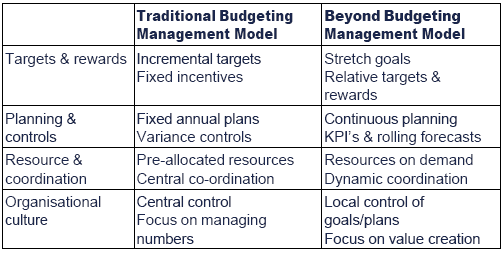Beyond Budgeting
Beyond budgeting is one approach to budgeting that tries to resolve the weaknesses and limitations of traditional approaches to budgeting.
Criticisms of traditional budgeting
Traditional budgets based on fixed annual periods:
encourage rigid planning and a lack of flexibility. This may not be appropriate in a fast moving business environment.
are time consuming.
encourage managers and employees to meet only the lowest target rather than attempting to beat the target set (this is inconsistent with a TQM approach).
encourage managers and employees to achieve the budget even if this results in undesirable action.
encourage managers and employees to spend what is in the budget, even if it is not necessary, to guard against next year's budget.
reinforce the barriers between departments rather than encourage knowledge sharing.
are seen as a mechanism for top-down control by senior management but organisations should be empowering individuals on the front-line.
ignore key drivers of shareholder value by focusing on short term financial performance.
produced inadequate variance reports leaving the 'how' and 'what' unanswered.
What is beyond budgeting?
Beyond budgeting is a leadership philosophy that relates to an alternative approach to budgeting which should be used instead of traditional annual budgeting.
Characteristics of beyond budgeting
Rolling budgets, produced on a quarterly or monthly basis, are suggested as the main alternative to annual budgeting. These are flexible, do not rely on obsolete figures and should result in more timely allocation of resources.
The rolling forecasts will embrace KPIs based on the
balanced scorecard which is linked to organisation strategy. Managers' performance measures will be based on this.
The budget may also incorporate benchmarking linking managers' targets to external benchmarks and not past performance.
Focus efforts on managing future results and not explaining past performance.
Allow operational managers to react to the environment.
Summary of the main differences between the traditional and the new beyond budgeting model as outlined by Jeremy Hope:

Suitability
Industries where there is rapid change in the business environment. Flexible targets will be responsive to change.
Organisations using management methods such as TQM. Continuous improvement will be key.
Organisations undergoing radical change, e.g. using business process re-engineering. Budgets may be hard to achieve in such circumstances.
Benefits of the 'beyond budgeting' model;
It shifts the focus from beating other managers to beating the competition by creating a climate based on competitive success.
It motivates individuals by giving clear responsibilities and challenges.
It eliminates some behavioural issues by making rewards team-based.
Authority is devolved to operational managers who are closer to the action and so can react quickly.
Operational managers are empowered to deliver key ratios rather than keep to strict budget limits.
It establishes customer-orientated teams.
It creates information systems which provide fast and open information throughout the organisation.
Application of the "beyond budgeting" approach
The private sector
This entails devolved managerial responsibility where power and responsibility go hand in hand.
- The focus moves from beating other managers to beating the competition.
- It motivates people giving them challenges, responsibilities and clear guidelines.
- Rewards are team based.
- Performance responsibilities are given to operational management who are closer to the action.
- It empowers managers to remove resource constraints
- Creation of open information systems throughout the organisation.
The public sector
The greater flexibility that lies at the heart of beyond budgeting may prevent successful application of the model in the public sector.
Beyond budgeting would require a mindset which not only moves away from control but also requires a reduction in internal politics which has been at the heart of the public sector for many years.
The managers within the public sector may have the desire for flexibility but are likely to remain constrained by the inability of their organisation to change.
|
Created at 6/13/2012 2:04 PM by System Account
(GMT) Greenwich Mean Time : Dublin, Edinburgh, Lisbon, London
|
Last modified at 11/14/2012 2:45 PM by System Account
(GMT) Greenwich Mean Time : Dublin, Edinburgh, Lisbon, London
|
|
|
|
 |
Rating
:
|
 Ratings & Comments
(Click the stars to rate the page) Ratings & Comments
(Click the stars to rate the page)
|
 |
Tags:
|
|
|
|
|